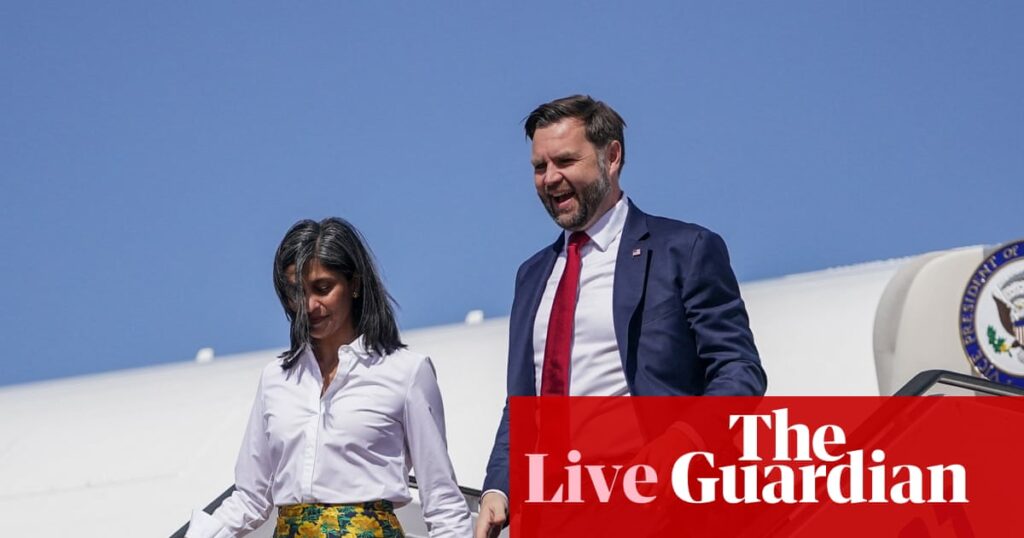JD Vance arrives in Israel amid efforts to shore up fragile ceasefire
US vice-president JD Vance has arrived in Israel with his wife, Usha.
He is expected to meet with Israeli prime minister Benjamin Netanyahu and president Isaac Herzog in Jerusalem tomorrow.
Vance will discuss the further implementation of the ceasefire during his visit.
Key events
As we mentioned in the opening summary, US President Donald Trump’s special envoy Steve Witkoff and adviser and son-in-law Jared Kushner arrived in Israel yesterday in a push to reinforce the fragile ceasefire in Gaza.
They have been pictured in a handout with recently released hostages:
The US treasury secretary, Scott Bessent, has urged Israel’s far-right finance minister Bezalel Smotrich to “fully embrace” the fragile ceasefire deal that came into effect earlier this month.
A readout of their meeting published yesterday said:
Today, Secretary of the Treasury Scott Bessent met with Minister Bezalel Smotrich of Israel to reaffirm the strong ties between the United States and Israel.
Secretary Bessent encouraged Minister Smotrich to fully embrace President Trump’s landmark peace deal and thanked the minister for his leadership in Israel. The Secretary also underscored the historic return of the hostages, and noted the great potential for expansion of the Abraham Accords.
EU criticised for pausing sanctions on Israel

Jennifer Rankin
The EU has been criticised for pausing sanctions against Israel’s government in response to Donald Trump’s peacemaking efforts in the Middle East, as the fragile ceasefire came under threat.
After meeting EU foreign ministers on Monday, the European foreign policy chief, Kaja Kallas, announced a pause on efforts to suspend preferential trade with Israel and sanctions against people responsible for fuelling the conflict on both sides.
The context had changed since the measures were proposed last month, Kallas said. Noting “divergent views”, she said ministers had agreed: “We don’t move with the measures now, but we don’t take them off the table either because the situation is fragile.”
Two people who worked for the EU in senior roles, speaking separately, criticised the decision not to move forward with sanctions.
Sven Kühn von Burgsdorff, a former EU representative to the Palestinian territories, told the Guardian that Kallas missed “the point” on legal accountability. “Sanctions are not just a measure to induce or coerce a third party to change or adjust its behaviour.
Restrictive measures are part of the tools the EU has given itself to react to breaches of both European and international law,” he said.
You can read the full story here:
Here are some images sent to us over the newswires from Gaza:
The Guardian’s diplomatic editor, Patrick Wintour, has explored the immediate challenges Qatar faces in this piece detailing the Gulf state’s centrality to ceasefire negotiations. Here is an extract:
It will be expected to use its experience mediating with Hamas going back as far as the George W Bush administration to persuade the Islamist militant group to disarm. That will require detailed and laborious work, including over the nature of the weapons, the future of the vast tunnel network under Gaza and the body to which Hamas fighters could decommission its weapons. Qatari money may be needed, and senior Hamas figures may be offered exile.
Second, Qatar may switch its attention to the PA, the Fatah-controlled government body’s promises of reforms and the elections for a new leadership in a year. Qatar may also not want to be drawn again into the ad hoc arrangement, encouraged previously by Netanyahu, that resulted in the Gulf state funnelling $4bn (£3bn) of aid into Gaza’s infrastructure and the territory’s poorest families from 2012.
Qatar’s emir condemns Israel’s ‘continued violation’ of Gaza ceasefire
Speaking at the opening session of Shura council, Qatar’s legislative council, Emir Sheikh Tamim bin Hamad Al Thani accused Israel of violating the 11-day-old ceasefire.
“We reiterate our condemnation of all Israeli violations and practices in Palestine, particularly the transformation of the Gaza Strip an area unfit for human life (and) the continued violation of the ceasefire,” he said.
“It is unfortunate that the international community remains incapable of enforcing respect when it comes to the tragedy of the Palestinian people.”
The Palestinian news agency said that Israel has violated the ceasefire 80 times and killed at least 80 Palestinian people since the deal went into effect.
Separately, Israel carried out an airstrike on a Hamas negotiating team in Qatar in September, which caused a huge diplomatic fallout. Qatar said at the time that it constituted a “blatant violation of all international laws and norms”.
Qatar, a close US ally, had been hosting negotiations aimed at securing a ceasefire in Israel’s war in Gaza. Despite the deadly strike on its capital, it continues to play a key role as an intermediary, although relations with Israel are extremely fraught.
If the US-brokered ceasefire is not completely derailed, Qatar, which has hosted the Hamas political bureau since 2012, will likely be vital in trying to persuade the militant group to disarm, given its mediation experience.
Israel says remains of another hostage returned from Gaza identified
Israel has confirmed that the remains of a hostage held in Gaza, returned by Hamas a day earlier, had been identified as those of Tal Haimi, who was killed on 7 October 2023.
The Israeli prime minister’s office said:
Following the completion of the identification process … representatives of (the army) informed the family of the hostage, Sergeant Major Tal Chaimi, of blessed memory, that their loved one had been returned to Israel and his identification had been completed.
Haimi, 41, commander of the Nir Yitzhak kibbutz defence militia, was killed in the Hamas-led 7 October attacks on southern Israel in 2023, in which about 1,200 people were killed and 251 taken hostage. His body was taken to Gaza. He had four children, including one born after the attack.
Under the terms of the ceasefire agreement, Israel is still waiting for Hamas to turn over the remains of 15 deceased hostages. Thirteen bodies have been released since the ceasefire began.
Mediators understand that Hamas is having trouble locating all of the dead but the Israeli government believes the Palestinian militant group is making insufficient effort.
Hamas says the war’s devastation and Israeli military control of certain areas of Gaza have slowed the handover.
Vance due in Israel as another hostage’s body is returned
We are restarting our live coverage of the fragile ceasefire between Israel and Hamas, and the diplomatic efforts to try to maintain it.
The 11-day ceasefire in Gaza was seriously undermined on Sunday after Israel launched waves of deadly airstrikes and said it would cut off aid into the territory “until further notice” after a reported attack by Hamas, which the militant group denied being involved in.
In an attempt to ensure the ceasefire holds and to discuss the further implementation of the US brokered plan, US vice-president JD Vance is due to visit Israel later today.
In a speech on Monday to the Knesset, Israeli prime minister, Benjamin Netanyahu, was vague about what he would speak about with Vance, whose diplomatic trip to Israel is set to last until Thursday.
“We will talk about two things, mainly the security challenges and the diplomatic opportunities we face,” Netanyahu said. “We will overcome the challenges and seize the opportunities.”
The fragile ceasefire agreement appeared back on track as Israel received the remains of another hostage in Gaza and Israel allowed humanitarian aid deliveries to resume to the territory devasted by relentless Israeli bombardments. A UN spokesperson did not say how much aid was getting in.
Israel had threatened on Sunday to halt aid shipments and its forces killed dozens of Palestinian people in airstrikes across Gaza after accusing Hamas militants of killing two soldiers. Israel later said it resumed enforcing the ceasefire that began on 10 October.
Donald Trump said on Monday that he would give Hamas a chance to “behave” or else be “eradicated”.
The US president’s special envoy Steve Witkoff and son-in-law Jared Kushner, who helped broker the ceasefire agreement alongside Egyptian, Qatari and Turkish mediators, met with Netanyahu yesterday.
It came as Hamas negotiators reportedly met with Egyptian mediators and Palestinian factions in Cairo. Negotiations about the second phase of the Trump plan will include discussions about the eventual withdrawal of the IDF and the disarmament of Hamas, something the militant group has expressed serious reservations about.

